Tabernacles and the city

A succah on the balcony of an old house on Rehov Lilienblum, a spit away from the rooftop. In the background one of the luxury residential towers still under construction.
Succot. In Tel Aviv, as all over Israel, religious and not so religious people, erect a succah or booth or 'tabernacle' in their back gardens or on their balconies and spend time there during the week long Succot festival.The custom derives directly from the bible.
"In Leviticus, God told Moses to command the people: “On the first day you shall take the product of hadar trees, branches of palm trees, boughs of leafy trees, and willows of the brook” (Lev. 23:40), and “You shall live in booths seven days; all citizens in Israel shall live in booths, in order that future generations may know that I made the Israelite people live in booths when I brought them out of the land of Egypt” (Lev. 23:42-43).Why God should want future generations to know that he made his people live in booths remains a mystery. Nevertheless, the experience of spending some time in a succah, under the stars, or in Tel Aviv's case, under the street lights, does remind you of the transitory nature of human existence.
How to Build a Succah. First, you need to erect the basic frame out of planks. Second, you need to cover it with green branches, otherwise known as schach. In religious neighbourhoods, this is distributed by the municipality. Then you need to decorate your succah with hanging fruit, rolls of tissue paper, pictures and anything else that comes to hand. Nowadays though, the sound of sawing planks and hammering nails has been replaced with the grunts of succah-builders twisting the pipes of their 'succah lenetzah' (permanent or eternal succah) that comes as a ready made kit.
If you're religious, you'll eat all your meals and even sleep in your succah, invite neighbours in for a nibble and visit the succah of others.
If you're not religious, you've probably made your succah because of your kids. For kids, living in a succah is a bit like living in a tent. A young couple, from the old building next door, not having a balcony or a back garden, built their succah in an unused corner of the parking lot behind their house. Their little boy squealed with delight as the succah took shape.
and at night it went electric

All you need for a succah is three walls and a green roof. Neighbours on Rehov Stein tied plastic bags together to make the walls and hung a few branches on top.
 'succah kshera lemadrin' (a 100% kosher succah) a passing man in a hat commented to me as I was taking this photo.
'succah kshera lemadrin' (a 100% kosher succah) a passing man in a hat commented to me as I was taking this photo.





Comments